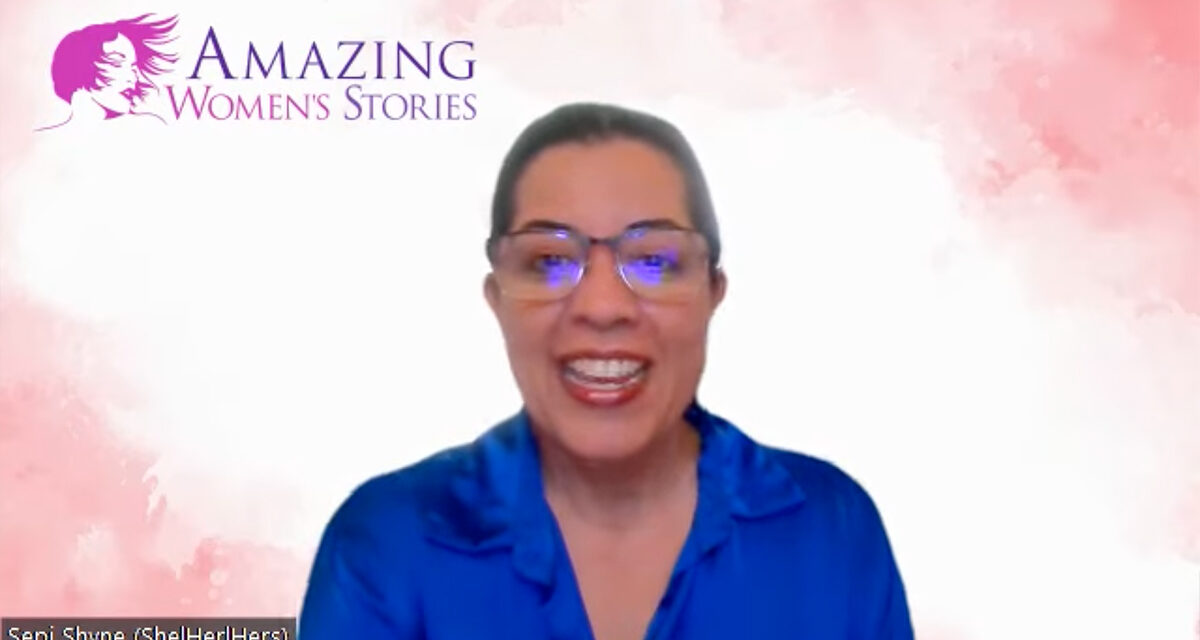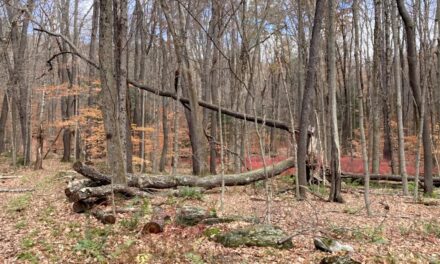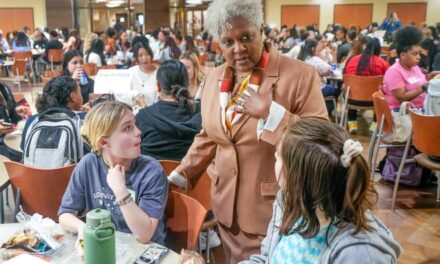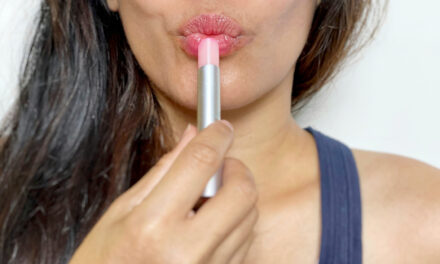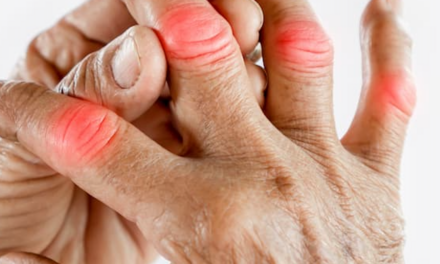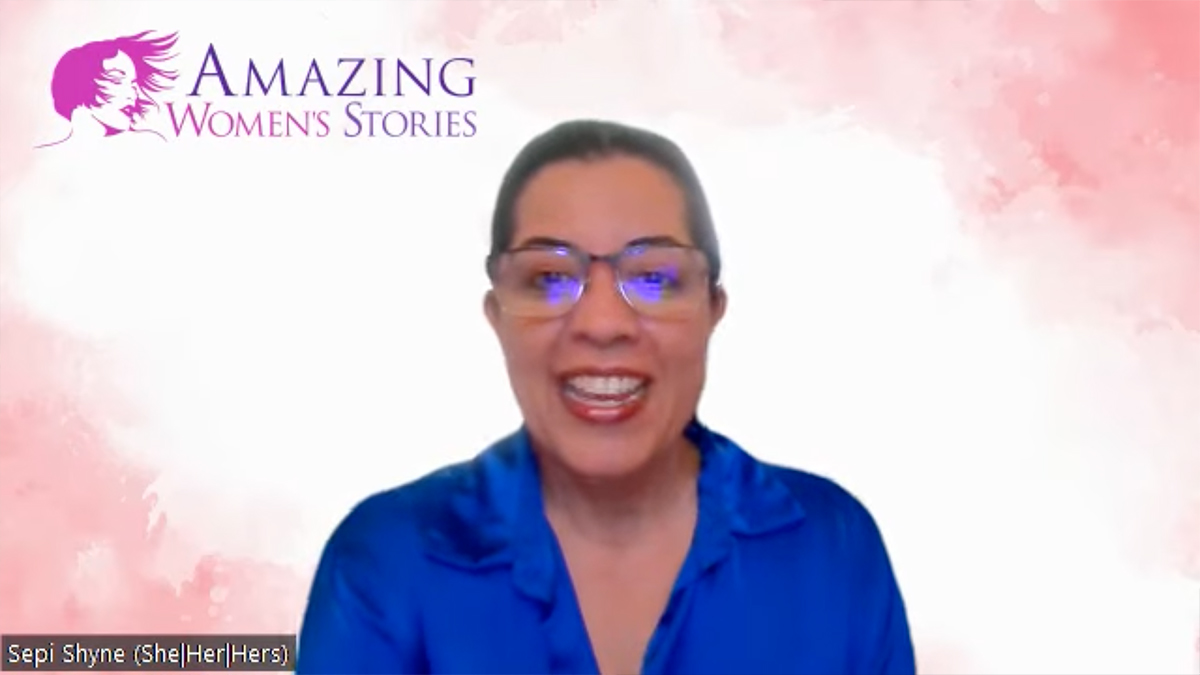
Mayor Sepi Shyne gave an unusually candid interview on new episode of a YouTube series called Amazing Women’s Stories.
In the interview, Shyne steps of her shell and shares intimate details with host Raymond Eshagian about her earliest days, fleeing Iran and growing up in the United States as an undocumented immigrant and a closeted lesbian. The mayor gives listeners some insight into her reiki practice and other less-understood parts of her life. And, of course, no Sepi Shyne interview would be complete without a weak jab or two at WEHOville.
A transcript of the interview is published below:
‘I didn’t have a normal child’s life’
I was born in Iran. I was two when the revolution happened and the subsequent war.
My dad spoke up against the Islamic regime, and they put him in jail for a few months. When he got out, he started planning our escape. I have four siblings. One of them was the only one I knew because three of my older siblings were already in America by the time I was old enough to recognize them. So, my younger sibling, who was 11 years older than me, was going to turn 15. We smuggled him out of the country. I was five when my parents and I were able to get a visa and flee Iran and come to America. We settled in Northern California. I was undocumented till I was 16. When I arrived in Northern California, we lived with my sister, so I met my three siblings for the first time. They were trying to be my parents, and my sister always tells the story that I said, “Hey, I already have two parents; you got to be my sister, not my mom” as a little kid.
When I was going to kindergarten in Cupertino, I was the only brown kid in the school. It was during the Iran hostage crisis, and there was a lot of racism against Middle Eastern people and Iranians in particular. The kids called me names. I didn’t speak English, and they threw what’s called tan bark, the wood chips. In Northern California, we say tan bark; I think down here, it’s wood chips in Southern California.
They were throwing wood chips at me. I went to let the yard duty, who was a volunteer person to watch over the kids during recess, know what was going on, but I didn’t speak English, so I’m the one that got in trouble. I learned English very fast after that. It must have been tough being there and not knowing the language. It was tough, and my parents didn’t know the language, so I kind of had to become an adult very quickly. I didn’t have a normal child’s life. I was sort of taking care of my parents. I learned English. I was teaching my mom English at a very young age. I had to grow up really fast.
In high school, I discovered that I was a lesbian. I thought I was bisexual before that. My first memory of any kind of affection or crush on anyone was this Iranian girl in Iran. Holding her hand and kissing her cheek, I would fantasize about this. As I grew older in the Iranian family, everything was about the traditional family. I noticed that my girl cousins liked boys, and my boy cousins liked girls. I looked at myself once when I was nine, thinking, “Why am I also looking at the girls? Oh, I’m a girl.” And then I just kind of went along my way. I didn’t think too much about it.
‘My dad was very homophobic’
Then in high school, I thought I was bisexual. I kissed so many boys, waiting for them to turn into princesses. None of them ever did. The first time I kissed a girl, wow, it was fireworks, everything I ever saw in romantic movies at the movie theater.
I knew that I was a lesbian. I came out, and of course, there was a lot of homophobia in my high school. The younger boys, within the family, being Iranian, I know it’s not easy. It wasn’t easy. My dad was very homophobic. Whenever there was pride on TV, he would say things like they should kill all of them, put them all on an island, get rid of them. It was very hurtful because I was in the closet.
“So that was very hard but I came out to my mom when I was 19. And I prepped her. I was very very close to my mom, she was my best friend and so I prepped her. I gave her the book that Betty DeGeneres wrote about Ellen DeGeneres’s coming out. I said, ‘Can you read this?’ And then I gave her another book called ‘Prayers for Bobby’ which was about a young boy in Walnut Creek that committed suicide after he came out to his mom who was very religious and she just would put scriptures up and just so much judgment and put a lot of pressure on him because of her misinterpretation of the Bible. And so she went on after his suicide to have a crisis spiritual crisis and eventually ended up becoming LGBTQ advocate.
So I came out to my mom, then eventually to my family. And I’ve always just known that I need to be authentic. I can’t be anything other than who I am. And I’m so glad that my dad specifically helped us flee Iran because I probably would have been killed because I wouldn’t be able to be in the closet and not be who I am. And so, I, my parents and family went from just, you know, being upset at first, having to go through their normal grief and I just stood in my courage and who I was and helped them understand by having conversations and being mature about it. Conversations after conversations after conversations and every time they would say something that was not okay. For example, I had a 10-year relationship with another Iranian Assyrian and Armenian woman and they used to call her my friend and we were partners and I would correct them say no she’s my partner. Let me tell you why you can’t use your own safe friend and have these conversations.
They went from being tolerant to accepting to embracing and now they all advocate for the LGBTQ community and it’s just wonderful organizations and conversations. But I do want to share a pivotal story that put me on the trajectory to where I am today. My girlfriend and I, her name is Trish, back in 1997, second year of college, we were sitting at a gay-friendly coffee shop. There were no gay coffee shops that owned coffee shops really back then. Not many, actually they may have been one called Leviticus in San Jose but we were at another one that was friendly and the management had changed and we were sitting in the patio, drinking our lattes, talking about what graduate schools we want to go to, what dreams we had together for the future. The next thing I know the manager and a police officer were standing above us and the police officer looked down at us and he said, ‘You two need to get up and leave. The manager doesn’t want your kind in this establishment.’ He then blew a kiss and winked at me. And as two young Iranian immigrants, it was really scary because it was an abuse of power similar to what was what happened with the Revolutionary Guard in Iran. And just as Iranian-American, it was shocking.
‘I’m tired of feeling powerless’
It was hurtful, it was degrading. We just got up, we ran out of there, we were in tears. And because we had just come out, I had just come out to my mom recently and she hadn’t come out to her parents, we didn’t have a support network. So we were driving around the freeway, I finally had it. I pulled the car over and I turned to her and I said, ‘I’m tired of feeling powerless. We need to go to law school, learn the law and stop this from happening to others.’ And that’s what we did. And that’s what both of you, we both did. And I became an LGBTQ civil rights advocate for over 20 years for the community and I dedicated all of my volunteer free time to fighting for equality. It was an awful incident but I took it as an opportunity to step up into what would be part of my purpose.
I fought for our community. I was the co-president of the LGBT bar association in 2008 because I moved to the bench and I worked together for 10 years and then we split up and I moved to LA and I got involved with the LGBT Bar Association. Within a year they nominated me to be co-president and we have the non-profit fight. And I ended up being on the forefront of that fight and then I was wooed by the Human Rights Campaign Los Angeles after my term ended at the bar association. So I joined the steering committee for Human Rights Campaign and worked with them for years and gone on to the Board of Governors, co-chair the gala, was a part of the membership and community events team and we got marriage equality finally in 2014 and I thought, ‘Wow, it’s time to pass the torch. I can, I can.’ In every room I was in, by the way, Raymond, in these spaces, LGBTQ spaces, I was often the only woman of color.
Often one of two or three lesbians or queer women. At that time there weren’t a lot of trans folks that were part of the Human Rights Campaign. They really shifted, thank goodness, after I left because we had a shift in culture to be more embracing of our transgender community. But I worked really hard to recruit women, and people of color, to create more diversity within these organizations. It was glaring to me, the lack of diversity and inclusivity at the time. And then we got marriage equality and I met my future wife. Who again, I’m divorced now, but who would be myself. I got married and we were together for 11 years. We met in 2011 and we got marriage equality. I took time off, I said I’m passing the torch, let me just focus on my two businesses and on my life. I’ve given so much, I think I’m good. And then 2016 came from, shifted everything.
So, we’re recently divorced but we did not have children. We do have two, three fur babies. Two Siamese Lynx points Siamese twins that are rescues, Iman and Amira, and Chloe, our dog, who is now the pet mayor of West Hollywood. She just was sworn in two weeks ago. I did litigation for three and a half years when I started practicing in law but I volunteered for non-profit organizations that were advocating for civil rights for the LGBTQ community. So I was on the boards of many organizations. I then moved to Northern California and started my own law practice. So I do business law and trademarks. I’m a solo practitioner and I also started an alternative healing business. I’m also an energy healer and a Reiki master and people are spiritual.
‘It was imbalance’
And I got into that because when I moved to Southern California I started having anxiety for the first time in my life. And it hit me out of nowhere. I would have trouble focusing, I would have panic attacks. I didn’t understand. I was always so bright and I passed the bar on the first try and I couldn’t believe that I was having trouble just adding numbers. It was all anxiety and I went to the Urgent Care twice thinking I was having a heart attack and they said, ‘Oh no, it’s just anxiety.’ I’m like, ‘Anxiety? What? I’ve never experienced this before. What is this?’ And at the time I had taken a little bit of time off when I moved to LA because I worked my whole life. I put myself through college and law school and all that.
My sister, when I moved here, I moved in with her and she said to me, ‘Sepi, just take some time off, it’s okay.’ I said, ‘Okay, I’m gonna take some time off.’ And so I had a spiritual reawakening. I started doing meditation, a poetic renaissance. I write poetry so I wrote a lot of poetry. But the anxiety was debilitating and then it spiraled into depression and the doctors gave me Xanax which, it works for some people, it didn’t work for me. And I had a friend in, when I was in Northern California, that was diagnosed with metastasized melanoma and it was Megan and she was 26. And the doctors gave her six months to live and she said, ‘No way, I’m gonna beat this.’ So she went on an all-organic diet. She did chemo pills and low-dose radiation treatments.
I lived with her and her partner during a transition time in my life for three months. And so she would come home and tell me about this Reiki healing she would get, this energy healing after having radiation treatments. And I didn’t, I just thought, ‘Wow, this is interesting but I’m so busy right now because I’m a litigator and I have to travel to here and there tomorrow.’ I didn’t have time to look into it but it stayed in my mind. She actually was able to live 22 months which is unheard of for a person that has multiple tumors in their brain, spots in their lungs. And just, it was a miracle. She did pass and at a time where I was very, very depressed but I was functioning, a functioning depressed person. Because that’s the same time I was fighting for our rights out and against Prop 8. But at home, I just was, I didn’t want to get out of bed. And I had a dream with Megan in my dream and she was pushing a red cart, wearing red.
And I woke up thinking, ‘Maybe I should look into energy healing, maybe that’ll help.’ And so I did. I learned Reiki and I became a Reiki master and I started a business called Soli Loom which means to light the soul. And all of a sudden I started getting clients left and right and I started doing energy healing and I gave myself energy healing every night. I went to an acupuncturist once a month and chiropractic care once a month and I got on Chinese herbs and within a little bit over a year, my anxiety and depression were completely gone. I got to the root cause by treating, creating the dis-ease with Eastern medicine. And it worked for me and I, you know, so I’ve had two businesses for years and my own walking testimony of, ‘Wow, this works.’ So what, if I may ask, what was the root cause that caused the anxiety, the depression?
It was imbalance. It was the trauma of going through a separation from my ex. I lost my dad when I was in law school. He was diagnosed with leukemia after my first semester and he died within five months. And in law school, nobody gives you time to process emotions. It’s just, it’s go, go, go non-stop. Yeah, you have to go, it’s go, go, go non-stop. It was a difficult time. It was a difficult time. It was a difficult time. And I’m very grateful that I’m so grateful that I learned Reiki and actually my spiritual practice helped me discover that my purpose is to bring light into the world. And it’s still illuminate. So I was already doing that with my family by being out and gay and having conversations with them to help them see the light, help them see the truth. And then in my law practice, I do business law and trademarks. I help protect people and that brings them joy. In my healing practice, I help people feel better and to see the light and I do that in office too. That’s very diverse and very inspirational. What a beautiful story. Wow, are those both businesses there in West Hollywood? Yeah, so my healing practice is based in West Hollywood and my law practice is in Los Angeles. And the family, are they still in Northern California or are they in Southern California? Yeah, my sister lives in Southern California. I have a lot of cousins in Southern California too, from my dad’s side. My three siblings and my mom live in Northern California.”
I can’t be anything other than who I am. I’m so glad that my dad helped us flee Iran because I probably would have been killed. I wouldn’t be able to be in the closet and not be who I am. My parents and family went from being upset at first, having to go through their grief, and I just stood in my courage, helping them understand. They went from being tolerant to accepting to embracing, and now they all advocate for the LGBTQ community.
I do want to share a pivotal story. My girlfriend and I were sitting at a gay-friendly coffee shop. The management changed, and the manager and a police officer asked us to leave. We were in tears. We didn’t have a support network. I pulled the car over and said, “I’m tired of feeling powerless. We need to go to law school, learn the law, and stop this from happening to others.” That’s what we did. I became an LGBTQ civil rights advocate for over 20 years. I started a healing business. I’m an energy healer and a Reiki master. I had anxiety and went to urgent care twice. I learned Reiki and became a Reiki master. I started a business called Soli Loom. I met my future wife. We were together for 11 years. We got marriage equality. I took time off. 2016 shifted everything. I pursued law. My career is in addition to what I do as mayor. I do business law and trademarks. I’m a solo practitioner. I also started an alternative healing business. I’m also an energy healer and a Reiki master. My healing practice is based in West Hollywood. My law practice is in Los Angeles. My sister lives in Southern California. My three siblings and my mom live in Northern California.
‘You need me.’
In 2018, I went back to HRC after Trump became president because I saw our rights being obliterated. I thought, “Well, I’m back. I need to do something. My job is not done. You need me.” Yes, you need me, and they were very happy to have me back. I joined the Human Rights Campaign again, and this time I was a co-chair of the political committee. I was helping pro-equality candidates with phone banking, fundraising, and organizing. I learned a lot more about politics. I’ve always loved politics, both as an attorney and as an immigrant to this country.
I became a citizen in my 20s and have voted in every single election. As an immigrant, when we get our voting rights, we know to take advantage of them. I rejoined the Human Rights Campaign, and my colleague on the Human Rights Campaign was on the Lesbian Advisory Board in the city of West Hollywood as an appointed official.
She left and told council member John Heilman about me. She said I should take her position. I thought that was interesting and decided to check it out. He interviewed me and appointed me to the Lesbian Advisory Board in 2018. I had already been living in West Hollywood for almost ten years, nine to be exact. There were many things I loved about our city, but I also felt there were areas that needed progress.
The city started as a very progressive city, but over time, some lost their sense of belonging. Many queer people didn’t feel like they truly belonged.
Many people of color didn’t feel safe in the city.
Even within our LGBTQ community, the bisexual community didn’t feel included. Many lesbians ended up leaving. When I started learning about the history of the city, I found out that there was only one queer woman, one lesbian, who was in office for 36 years, and she was only in office for one year. There were no women of color in office. There were no Iranians in office, even though the city had a significant Iranian population. There was a lack of representation. Several of my colleagues asked me if I would run for office.
‘For the first time, I saw pieces of myself in these candidates.’
At first, I was hesitant. Many women need to be asked multiple times before agreeing. However, after the November 2018 elections, which saw a wave of diverse candidates getting elected, I felt inspired. I saw Anna Eskamani, the first Iranian American to get into the Florida State House. Then there was Rashida Tlaib, a Muslim woman, and many other LGBTQ individuals and women getting into office. For the first time, I saw pieces of myself in these candidates. I realized that maybe I could serve in public office. The lack of representation means that if people don’t see themselves reflected in leadership roles, they don’t always feel that they can pursue them. Seeing bits and pieces of myself in these candidates inspired me. I decided to run for office.
I ran for City Council in 2019. I considered it a campaign boot camp because it was only for three months. I didn’t have a lot of experience, but I ran a strong campaign. I raised twenty-six thousand dollars and came close to winning a seat, missing out by only 142 votes. It was an impressive performance. I realized it wasn’t yet my time, but I learned a lot. I continued to campaign, expanded my network, and upgraded my approach. I ran again in a different election cycle, which had moved from March to November. I knew that this change would be beneficial for newcomers like me. Historically, it was challenging to defeat incumbents in West Hollywood. Part of the reason was that incumbents had a loyal base that would vote in March elections. I believed that a November election would have a higher turnout, which would be to my advantage. The campaign wasn’t easy. I faced racism and misogyny.
‘I don’t wait for people to tell me when it’s my time’
I heard comments like, “It’s not her time.” or “Let someone else take this opportunity.” I didn’t let these comments deter me. I don’t wait for people to tell me when it’s my time. I make my own time. I ended up winning the election and came in first place in November 2020. I received the highest number of votes in the history of West Hollywood. Another colleague and I managed to unseat two incumbents. This election shifted West Hollywood for the better, bringing it into the 21st century. For the first time, the city council had a female majority. I am the first out LGBTQ Iranian elected anywhere in the world. I recently found out that when I became mayor, I also became the first Iranian female mayor in all of America.
I have achieved many firsts. I am a trailblazer and a pioneer. I did face challenges as a woman, even in a diverse city like West Hollywood. One would think that in such a city, gender wouldn’t matter. But based on my experiences, there was discrimination. During my first campaign, someone online called me a terrorist and threatened to mace me if I approached their door. There were smear campaigns against me.
When I first joined the council, I noticed that when I would say the same things as my male colleagues, people would applaud them but not me. Some people questioned why I talked about being a lesbian or being Iranian. Representation is important, and I am proud of my roots. The amount of hate I faced was disproportionate compared to others, which made it evident that it was rooted in racism and misogyny.
There’s a local blog that was bought by someone who turned it into a toxic, right-wing platform. It’s like the Fox News of West Hollywood, which is sad and divisive for our community. On the positive side, I have achieved a lot during my time in office. I have passed more than 60 items in my first two years. Homelessness dropped by 60% under my leadership. We passed the nation’s first multi-stall gender-neutral bathroom bill. We also co-sponsored a bill at the state level to change the plumbing code, which was passed unanimously. We have the strongest tenant protections in the county. Our city is made up of 80% renters, and I am a renter myself. We created policies to increase affordable housing.
One of my proudest achievements was spearheading the creation of a 24/7 mobile Behavioral Health Crisis Response unit. This third responder system will greatly reduce the law enforcement response to homelessness. We received three hundred thousand dollars in funding from Congressman Schiff for these units, which will be operational soon. We raised the minimum wage to the highest in the country and provided paid time off and sick leave for all employees. I also fulfilled one of my campaign promises by creating a social justice task force made up of black, indigenous, and other people of color. This task force met for over a year and came up with policy recommendations to help dismantle systemic racism.
We accepted every recommendation and turned them into a permanent advisory board in our city. We have achieved many wonderful changes. I am on a mission of accomplishments.
How do I manage everything? I am passionate about all the areas I am involved in. My friends often ask me why I don’t have more fun. I don’t watch much television because I see it as a waste of time. When I live in my purpose, I have more energy. My message to women listening to my story is always to believe in themselves. It’s essential to be in tune with your intuition and know the difference between intuition and fear. When you choose intuition, it leads you on a path of all possibilities.

